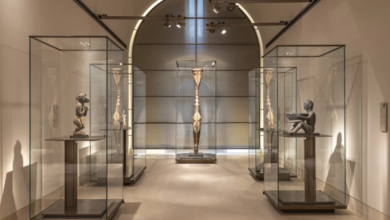Cinema : Father & Soldier (Tirailleurs), starring Omar Sy, « a good way to impulse change in ways of thinking?

The movie directed Mathieu Vadepied, which tells the story of the so-called Senegalese Tirailleurs, has been in theaters since January 4 in France and in French-speaking Africa. It is the French-Senegalese actor Omar Sy who plays the main role; he also co-produced the film. This is a new look at the history of this military detachment from the former French colonies in sub-Saharan Africa, which is still little known. Anthony Guyon, historian and teacher*, tells more.
Interview by Mérième Alaoui

What is your « historian’s » view of « Father & Son”?
I saw it for the first time last November, during the historical film festival in Pessac, and then we had a debate with the director Mathieu Vadepied. I found the film quite sober; I mean it is not at all in the Manicheism and even less in the polemic. It is true that for every historical film, some historians like to go into details, but I think the director was quite well advised. Besides, even if I have been working on the subject for a long time, I, like others, find that the theme has received too little attention, I am rather satisfied to see an ambitious film that retraces this part of history, without ever giving in to sensationalism.
Coincidentally, it was on the day of the film’s release that the French government announced that these former African soldiers would be able to receive the minimum old age pension while finishing their lives in Senegal. Does the cinema help to advance the cause?
Yes, it was announced on the same day… It is not for nothing that Aïssata Seck, granddaughter of a “Tirailleur”, declared that she hoped for the entry of a tirailleur in the Pantheon. This is a way to open the debate. For a long time now, associations, historians and artists have been trying to bring the history of the « tirailleurs » more to light, with varying degrees of difficulty. And now a film, starring Omar Sy, has been able to do it. So much the better! We must therefore seize this opportunity to make this history known and use the film to debate. It is a good way to impulse change in ways of thinking, to discuss. It is also the strength of culture that manages to convey messages to the largest number of people, like David Diop’s successful book « Frères d’âme ».
For a long time now, associations, historians and artists have been trying to shed more light on the history of the « tirailleurs » (…) here is a film, starring Omar Sy, that has been able to do it. So much the better! »
You have written a book on the subject of the Senegalese Tirailleurs, why this interest?
Yes, it’s a subject I’ve been working on for about fifteen years, but it was purely by chance at first. I wanted to look at a detachment of soldiers, of the colonial type. And it turns out that Vladimir Putin in the 90s returned to France important archives that had remained in Moscow since the Second World War. Once consulted, I had access to a real gold mine. Military archives with a lot of information on these African soldiers, their daily life, how they ate etc… This research allowed me to write my thesis by focusing on the 20s and 30s, then the Perrin publishing house offered me to write the first synthesis of the Senegalese Tirailleurs detachment. The thesis is a long and solitary work. After this period, which allows the historian to prove himself to his peers, I think that he should not lock himself up in an ivory tower but discuss, communicate, and continue to learn from the military, associations, families and all the actors who can contribute to a better understanding of his subject. I hope that the movie, my book and other initiatives can usher in a fruitful debate between honest people of good will.
It is difficult to summarize your work, but finally what do we know about the Senegalese Tirailleurs?
In the context of my research, I wanted to avoid sensationalism in order to fully grasp what the Senegalese Tirailleurs detachment was, far from the two world wars, from events, from the reductive triptych « Banani, chechia, machete ». Some of them served for more than ten years, fighting few battles, committing no act of indiscipline, performing no act of bravery. This banality interested me and allowed me to understand how colonial soldiers could serve. I also found some examination papers of candidates for the competitive examination for indigenous NCOs. They had a solid command of French but were also impacted by the courses they were given in history and civic education. The values of the Third Republic were taught, but to what extent could the values of freedom and equality be explained without the Tirailleurs turning them against the colonizing power? It is the same with women. If brothels were reserved for colonial soldiers, some of them went there essentially to discuss and fight against a certain nostalgia far from their territory and their loved ones.
« Africa’s history is not limited to the violence of colonization and its consequences »
You say that apart from this history and therefore the heavy colonial past with France, the history of Africa is benefiting from a renewed interest in France?
Yes, the history of colonization, as violent as it was, is not yet completely documented. There is still a lot to say and we must respect this painful memory and not be brutal. But there is a kind of movement of historians who are interested in Africa, beyond this legacy. The history of Africa is not limited to the violence of colonization and its consequences. Africa, as a field of research, is much richer, as it was before 1830 (the year Algeria was colonized). More and more of us are interested in African feminism, in trade unionism, Asia circulations, the place of the Cold War, the intellectual movement around pan-Africanism. So many fields to explore. It is also interesting to note that Africa is on the syllabus of the “Agrégation” and the “Capes” to obtain the competitive examination to teach history-geography. The excellent book published by François-Xavier Fauvelle and Anne Lafont, L’Afrique et le monde. Histoires renouées, is a manifesto that reminds us of the long history of Africa, which cannot be reduced to the last two centuries and the conquest/resistance paradigm.
That said, and Omar Sy recently paid the price, it is difficult to talk about this story in France without arousing passions and controversy…
I believe that with the anathemas and the completely made-up theories that are rampant in France, some people have this unjustified fear that to be interested in Africa would be to want to erase the history of France. No one says that! It is an essential part of our shared history, and it does not take away from everything else. By working on the Senegalese Tirailleurs, we shed light on the history of France, but also on the history of Napoleon III, Clemenceau and Jean Moulin. Let’s remember that the latter wore a scarf to hide a scar. In 1940, he tried to cut his throat to avoid signing a document that accused Senegalese Tirailleurs of abuses against civilians when the real culprits were German soldiers.
Historians must work together, as they did for the Algerian War and the First World War.
As far as you know, have African countries played a role in acknowledging the history of the Tirailleurs?
It should be remembered that initially, the Senegalese Tirailleurs did not have a good press and even left a bad memory in some places, such as in Madagascar in 1947. In Indochina, there were 60,000 of them, and despite some fears, they never joined the fight for the independence of the Indochinese. They remained loyal to France and finally in Africa, these men were not thanked. In the aftermath of the war, there was some hesitation as to which nationality to take.
In Senegal, this happened only when President Abdoulaye Wade proclaimed the day of the Tirailleur on August 23. As is often the case, with time, memories fade. In 2018, Malian President Ibrahim Boubacar Keita inaugurated alongside President Emmanuel Macron the new monument erected in memory of the Tirailleurs in Reims. The movie, far from any Manicheism, offers a reflection which goes that way.
*Les tirailleurs sénégalais. De l’indigène au soldat. De 1857 à nos jours, Perrin, 2022






